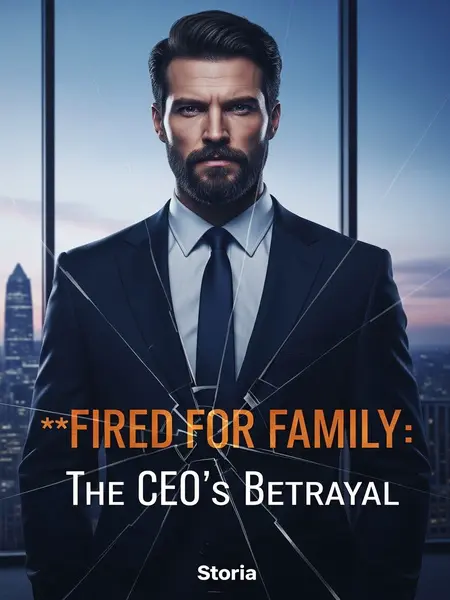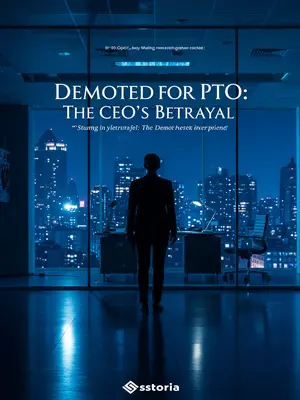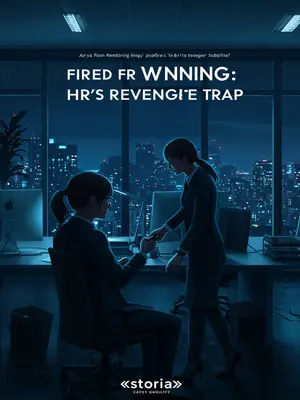Chapter 3: The Cold Goodbye
She’d barely finished before handing me a termination agreement.
It slid across the table like a death sentence. The folder’s slick cover felt colder than the room. My name stared up at me in bold, black ink—proof I was officially expendable. My fingers shook as I picked up the pen, but I didn’t sign—at least, not yet.
I was stunned.
My vision tunneled. Somewhere, a clock ticked too loud. I gripped the table, half-expecting someone to shout “Gotcha!” and end the nightmare. Was this really happening?
"Wait, what? You’re letting me go? After everything?"
My voice cracked, disbelief plain as day. Megan flinched at the words.
She apologized softly, saying it was a decision from upper management and she was just handling the paperwork.
She ducked her head, voice barely above a whisper. She twisted her wedding ring, eyes flicking to the door as if she wanted to bolt. For a second, I almost pitied her. But not enough to make this sting any less.
I started to realize what was happening. Facing Megan—who looked even more nervous than me—I suppressed my anger and asked quietly:
"Whose decision is this? Director Harris’s or Bill’s?"
I kept my voice low, hoping for some straight talk. My hands gripped the table so hard my knuckles turned white.
"I don’t know. I just got the notification."
Megan’s eyes darted to the papers, not meeting mine. She was sticking to the script.
"Have Director Harris see me. You can’t make this call."
My tone left no room for argument. I needed answers from someone who actually made decisions.
Megan’s voice was barely audible, but she stayed put.
"Director Harris is busy and not in. He said I’m fully responsible for this and can represent the company in communicating with you."
So this was how it was going to go. They’d sent in the HR rep to do their dirty work and left the real decision-makers behind closed doors.
I narrowed my eyes. The HR director was obviously avoiding me. Leaving everything to Megan meant the company had made up its mind—there was nothing to negotiate.
I looked around the small conference room—bland art on the wall, the faint smell of cleaning spray. It felt like being trapped in a dentist’s waiting room. I could almost hear the door locking behind me.
I picked up the agreement and glanced through it. All standard legalese, nothing worth reading.
I skimmed over paragraphs about at-will employment, non-compete clauses, all the usual boilerplate. It was all so impersonal. I wondered how many others had sat here before me, blindsided just the same.
So I straightened up and asked her:
"Fine, if the company wants to lay me off, I won’t argue. But how will my year-end bonus and profit share be handled?"
I locked eyes with her, searching for a glimmer of fairness. My voice was calm, but I could feel the frustration boiling just beneath the surface.
She was ready for this question.
Her hands moved automatically, flipping to a pre-marked page in the packet. She took a quick breath before answering, as if bracing herself for my reaction.
"Mr. Turner, the year-end bonus is a benefit distributed according to company performance. As you know, the group’s situation is tough this year—even if you stayed, you might not get a bonus."
"As for profit share, your project hasn’t recouped its total investment, so there are no dividends."
The words sounded rehearsed. I could tell she’d been told exactly what to say—and not to say a word more. My stomach turned.
"Come on!" I finally snapped at the puppet in front of me.
"When I joined, Bill personally promised me a $150,000 base salary."
"Before signing, you told me only the base salary would go in the contract to avoid taxes—the rest would be paid as a year-end bonus."
"My project turned cash-flow positive in seven months. Later repayments are profits. I even did the year-end profit budget myself. Now you tell me there’s nothing?"
I felt the heat rising in my face, fists clenched under the table. Loyalty turned to denial, just like that.
Megan blushed, giving me a look she thought was harmless.
She shifted in her chair, twisting her pen between her fingers. Her discomfort was palpable. It almost made me angrier.
"I don’t understand the business details."
She paused.
"But all those things you mentioned aren’t in your employment contract, right?"
There it was—the escape hatch. The real trap had been set from day one. My jaw tightened as it all sunk in.
I stared at her. Only then did I realize I’d underestimated her—and the company.
I replayed every conversation, every handshake. How easy it was to trust a promise over paperwork. The realization stung.
When I joined, Bill had promised at least $150,000, but the contract only stated $50,000 a year.
I’d asked about it, and Director Harris explained my total compensation was in three parts: base salary, year-end, and profit share. To avoid taxes, all execs got 60% as base salary, and the rest wasn’t in the contract—paid as a year-end bonus. That was the group’s standard practice.
I figured as long as the project succeeded, I’d easily clear $150,000, so I didn’t argue.
I’d seen other companies run things this way—backroom deals, handshake promises. I should’ve known better. But the dream was too big to let go.
Now I see I was too naïve.
It was a hard pill to swallow. I prided myself on being sharp, but sometimes hope makes fools of us all.
What Megan just said meant they were ready to deny everything.
Suddenly, she put on a fake smile.
It was the kind of smile you wear for a mugshot. Her eyes darted away as she recited the next part, desperate for it to be over.
"Oh, right, the company won’t treat you badly. According to labor law, we’ll pay you two months’ salary plus one."
"Mr. Turner, someone as capable as you will find a new job in no time."
"With the compensation, and the company speaking well of you on your record, isn’t that the best of both worlds?"
She said it like she was doing me a favor. I clenched my jaw, fighting the urge to shout.
"Are you threatening me?"
I shot her a glare, making it clear I wasn’t buying the sugarcoating. Her mouth snapped shut.
Megan went silent. I sneered and laid out the numbers for her.
"Compensation?"
"You only poached me last year. I’ve only been here a year, so that’s two months’ pay plus one, right?"
"Knowing your style, you’ll cap it at the legal monthly wage ceiling."
"Three times the state average wage, right? Just over $7,000 a month."
"So I get just over $14,000? Not even a tenth of the bonus I deserve."
"You people really know how to count."
I spoke slowly, making sure each word landed. The injustice tasted bitter, like burnt coffee.
After I called her out, Megan looked embarrassed.
She wouldn’t meet my eyes. I saw a flicker of regret—too little, too late.
"The state average wage cap is indeed how the group does it, as per the law."
"Mr. Turner, as I said, the year-end bonus was just your personal expectation."
"Getting over $14,000 for nothing is already pretty good. That’s half a year’s income…"
She trailed off, voice shrinking to nothing. It was clear she’d run out of lines from her script.
"Save it. I don’t accept these terms."
I slid the agreement back across the table and stood up. I wasn’t about to let them wash their hands of me that easily.
I couldn’t be bothered to argue further and went straight to Bill’s office.
I marched down the hall, heart pounding. I ignored the glances from passing staff. It felt like everyone knew except me.
His secretary didn’t stop me, but the office was empty.
His nameplate was still on the door, but the lights were off. A mug with a fading company logo sat cold on his desk.
I asked where Bill was.
The secretary said he was out on business for a few days and wouldn’t be coming in.
She barely looked up from her monitor, her tone rehearsed. I wondered if she’d been told to expect me.
I took out my phone and called Bill directly, but he never picked up. On my sixth call, someone finally hung up on me.
Each ring was a fresh insult. By the sixth try, it was clear—I wasn’t getting through. The final hang-up was the only answer I needed.
I’d still held a sliver of hope that I was just collateral damage from internal politics, but that was gone now.
Standing there in the empty hallway, I felt the last bit of trust drain away. I was on my own.













